Mushrooms are not only known for their unique flavors and textures, but they also offer an impressive array of nutrients. Whether you’re a mushroom lover or just curious about their nutritional value, you’ll be delighted to learn that mushrooms are a surprisingly good source of protein.
These fungi, native to North America and Europe, are low in calories but packed with essential vitamins, minerals, and antioxidants. Not only can they enhance the taste of your favorite dishes, but they also provide numerous health benefits.
Key Takeaways:
- Mushrooms are a type of fungus with delicate flavor and meaty texture.
- They are low in calories but rich in essential vitamins, minerals, and antioxidants.
- Mushrooms, such as cremini mushrooms, are an excellent source of zinc, which can help lower blood pressure and boost the immune system.
- They are also a good source of fiber and protein.
- Mushrooms contain an indigestible carbohydrate called chitin.
As you explore the nutritional facts about mushrooms, you’ll discover their surprising protein content, the role of protein in a healthy diet, and the benefits of other nutrients found in these fungi. So, let’s dive deeper into the world of mushrooms and uncover whether they don’t or do mushrooms have protein?!
Understanding Mushroom Nutrition
Table of Contents
Before we dive into the protein content of mushrooms, it’s important to understand their overall nutritional composition. Mushrooms are a type of fungus that are native to North America and Europe. They are known for their delicate flavor and meaty texture, making them a popular ingredient in various cuisines around the world.
Mushrooms are not only low in calories but also packed with essential vitamins, minerals, and antioxidants. They are a rich source of B vitamins, including riboflavin, niacin, and pantothenic acid, which play a crucial role in energy production and metabolism. Additionally, mushrooms contain minerals such as selenium, copper, and potassium, which are important for maintaining optimal health.
One particular nutrient that mushrooms excel in is zinc. Health benefits of mushrooms varieties like cremini mushrooms are an excellent source of this essential mineral, which is known for its role in immune function, wound healing, and DNA synthesis. Zinc also plays a crucial role in regulating blood pressure and supporting overall cardiovascular health. So, including mushrooms in your diet can offer multiple health benefits.
In addition to their high nutritional value, mushrooms are also a good source of dietary fiber and protein. Fiber is essential for maintaining a healthy digestive system and can help regulate blood sugar levels and promote satiety. On the other hand, protein is necessary for building and repairing tissues, supporting immune function, and aiding in hormone production.
As we explore the protein content of mushrooms, it’s fascinating to note that they also contain an indigestible carbohydrate called chitin. While chitin itself does not provide any nutritional value, it possesses potential health benefits such as supporting digestive health and aiding in weight management.
Mushrooms also have the unique ability to increase their vitamin D content when exposed to light. Vitamin D plays a crucial role in bone health, immune function, and mood regulation. So, by incorporating mushrooms into your diet, you can naturally boost your vitamin D intake, especially if you spend limited time in the sun.
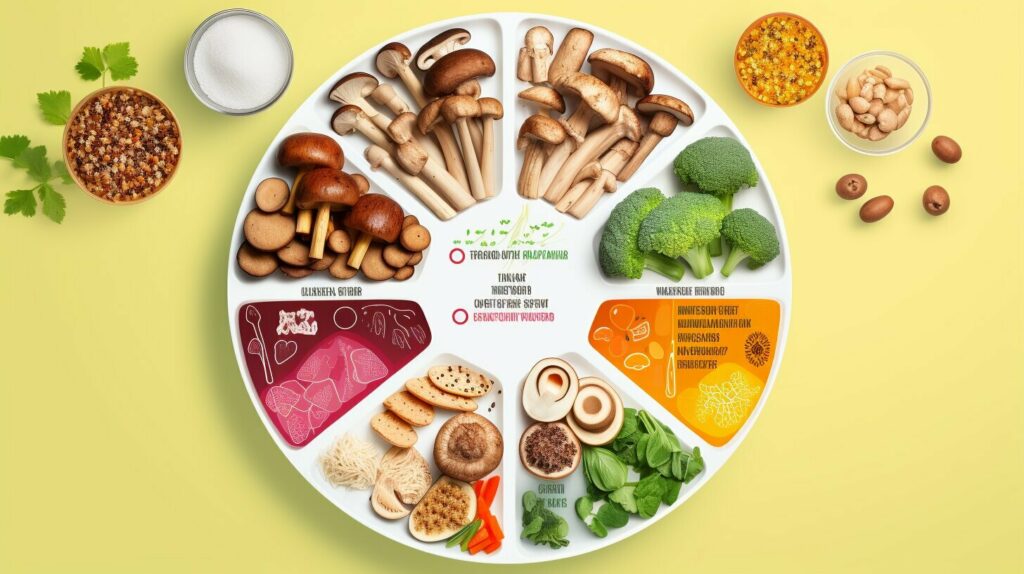
Mushroom powder supplements are another convenient option for those looking to enjoy the benefits of mushrooms without necessarily including them in their meals. These supplements are made from dried and ground mushrooms, providing a concentrated source of their nutritional value. They can be easily added to smoothies, soups, or other dishes to enhance both flavor and nutrient content.
In conclusion, mushrooms offer not only a unique taste and texture but also a wide range of nutritional benefits. From their high vitamin and mineral content to their fiber and protein content, mushrooms are a valuable addition to any well-balanced diet. So, whether you enjoy them fresh, cooked, or in supplement form, mushrooms can provide a delicious and nutritious boost to your overall health and well-being.
Protein in Mushrooms: A Surprising Revelation
While mushrooms may not be the first food that comes to mind when thinking about protein sources, they do indeed contain this important macronutrient. In fact, mushrooms are considered a valuable vegetarian protein option and can be a great addition to a balanced diet. So, if you’re looking to incorporate more protein into your meals, mushrooms are a delicious choice.
When it comes to protein content, different mushroom varieties may have varying levels. For example, shiitake mushrooms are known to have higher protein content compared to white button mushrooms. However, regardless of the specific variety, mushrooms can offer a decent amount of protein to support your dietary needs.

| Mushroom Variety | Protein Content per 100g |
|---|---|
| Shiitake | 2.2g |
| White Button | 2.2g |
| Portobello | 3.6g |
| Crimini | 3.1g |
Aside from being a source of protein, mushrooms offer a range of other nutritional benefits. They are low in calories and fat, making them an excellent choice for those watching their weight. Additionally, mushrooms are rich in essential vitamins, minerals, and antioxidants, which can contribute to overall health and well-being. So, whether you enjoy mushrooms as a side dish, incorporate them into your stir-fries, or use them as a meat substitute in your favorite recipes, they are a versatile and nutritious option to consider.
The Protein Content in Different Mushroom Varieties
Not all mushrooms are created equal when it comes to their protein content, so let’s take a closer look at some popular varieties. Among the many types of mushrooms, white button mushrooms, cremini mushrooms, and portobello mushrooms stand out for their protein content. These varieties are not only versatile in recipes but also pack a punch when it comes to nutritional value. Here is a breakdown of the protein content in each:
| Mushroom Variety | Protein Content per 100g |
|---|---|
| White Button Mushrooms | 3.1g |
| Cremini Mushrooms | 3.9g |
| Portobello Mushrooms | 4.7g |
As you can see, portobello mushrooms have the highest protein content among these varieties. Whether you’re a vegetarian, vegan, or simply looking to incorporate more protein into your diet, these mushrooms can be a great addition to your meals.
Aside from their protein content, mushrooms are also a good source of fiber. Including fiber-rich foods in your diet can help support digestion and promote feelings of fullness. Additionally, mushrooms contain essential vitamins and minerals, such as potassium, magnesium, and B vitamins.
“Mushrooms, such as cremini mushrooms, are an excellent source of zinc and can help lower blood pressure and boost the immune system.”
It’s important to note that the protein content may vary slightly depending on the size and freshness of the mushrooms. However, incorporating a variety of mushroom types into your diet can ensure you receive a good amount of protein along with other nutritional benefits.

Protein plays a crucial role in building and repairing tissues, supporting immune function, and promoting overall health. It is an essential nutrient that our bodies need to function properly. When it comes to protein sources, most people think of meat, poultry, and fish. However, there are other surprising sources of protein, and mushrooms happen to be one of them.
Mushrooms are not only delicious but also a good source of protein. They are low in calories and fat, making them a healthy addition to any diet. Whether you’re a vegetarian, vegan, or simply looking to incorporate more plant-based proteins into your meals, mushrooms can be a great option.
As shown in the table below, different mushroom varieties have varying protein content. For example, shiitake mushrooms contain about 2.2 grams of protein per 100 grams, while portobello mushrooms have approximately 3.6 grams. Even white button mushrooms, the most common variety found in grocery stores, provide around 3.1 grams of protein per 100 grams.
| Mushroom Variety | Protein Content per 100g |
|---|---|
| Shiitake | 2.2g |
| Portobello | 3.6g |
| White Button | 3.1g |
In addition to protein, mushrooms offer a wide range of nutritional benefits. They are an excellent source of vitamins, minerals, and antioxidants. For example, cremini mushrooms are rich in zinc, which can help lower blood pressure and boost the immune system. Mushrooms are also a good source of fiber, which promotes digestion and heart health.
So the next time you’re planning a meal or looking to add more protein to your diet, consider incorporating mushrooms. They are versatile, flavorful, and offer a variety of health benefits. From salads to stir-fries, soups to sandwiches, mushrooms can be enjoyed in countless dishes and provide a plant-based protein option that is both nutritious and delicious.
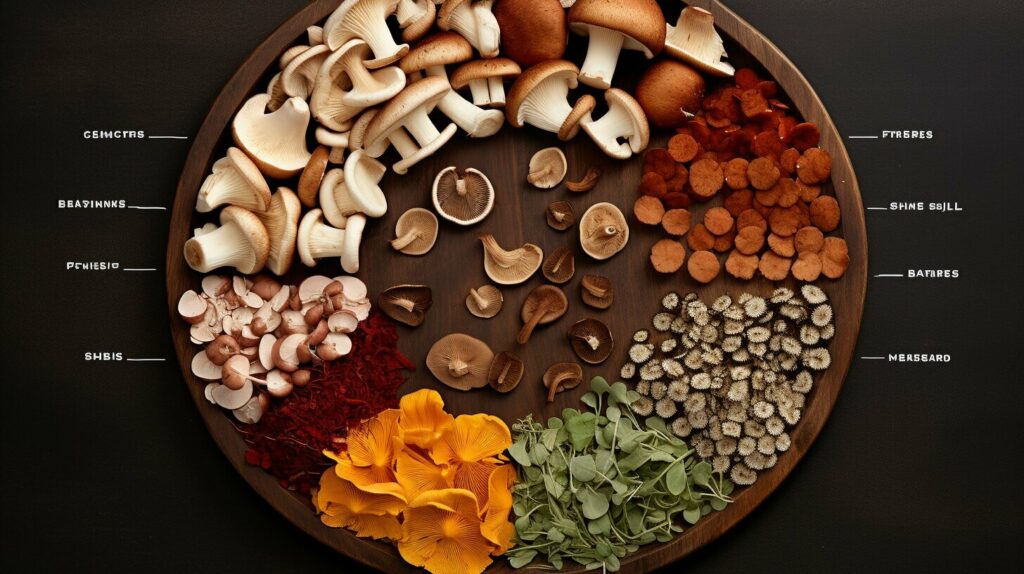
In addition to protein, mushrooms offer a plethora of other nutrients that can benefit your overall well-being. These fungi are packed with vitamins, minerals, and antioxidants that contribute to their impressive nutritional value.
One notable nutrient found in mushrooms is zinc. Zinc is essential for various bodily functions, including immune system support, wound healing, and cell growth. Cremini mushrooms, in particular, are an excellent source of zinc, making them a great addition to your diet. Consuming zinc-rich foods like mushrooms may help lower blood pressure and strengthen your immune system.
Another important component of mushrooms is fiber. Fiber is crucial for maintaining a healthy digestive system and can contribute to better heart health. Including mushrooms in your meals can be a delicious way to increase your fiber intake and support overall wellness.
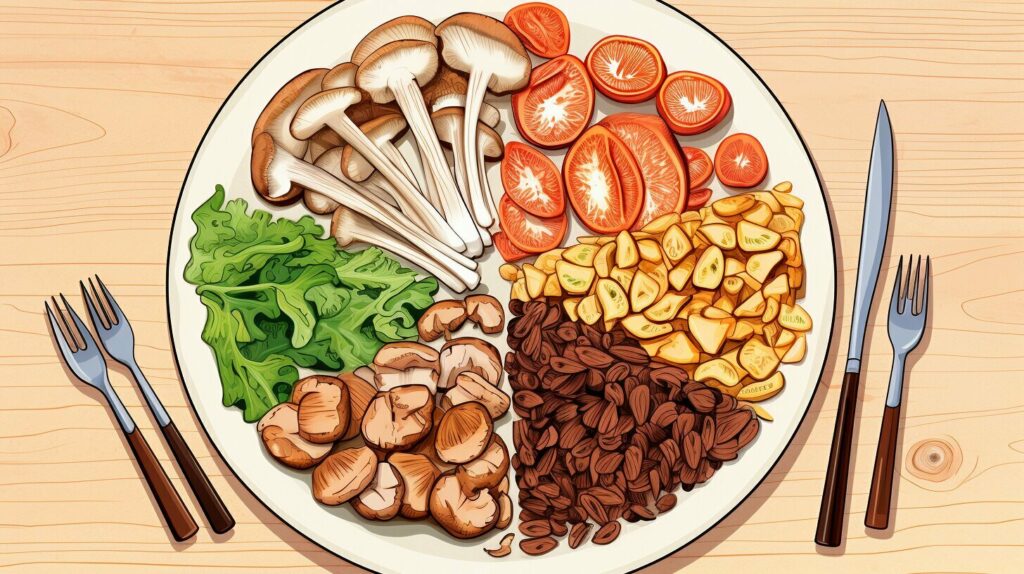
Additionally, mushrooms contain an indigestible carbohydrate called chitin. While chitin itself does not provide any nutritional value, it may have beneficial effects on gut health and immune function. Studies have shown that chitin can stimulate the growth of beneficial gut bacteria and enhance immune responses.
Finally, mushrooms have the unique ability to increase their vitamin D content when exposed to light. Vitamin D plays a crucial role in bone health, immune function, and mood regulation. Incorporating light-exposed mushrooms into your diet can be an excellent way to boost your vitamin D levels naturally.
| Nutrient | Per 100g of Mushrooms |
|---|---|
| Fiber | 2.5g |
| Zinc | 1.4mg |
| Vitamin D | 0.25μg |
With their impressive nutritional profile, mushrooms are a versatile ingredient that can enhance the overall nutritional value of your meals. Whether you enjoy them sautéed, grilled, or added to soups and salads, mushrooms offer a delicious way to boost your intake of essential nutrients.
The Benefits of Zinc in Mushrooms
Mushrooms, particularly cremini mushrooms, are a fantastic source of zinc, which plays a vital role in various bodily functions. Zinc is an essential mineral that supports immune function, promotes wound healing, and helps maintain healthy skin and vision.[^1^] Including mushrooms in your diet can be a delicious way to meet your zinc needs. Just a one-cup serving of cremini mushrooms provides about 1 milligram of zinc, which is about 9% of the recommended daily intake for adults.[^2^]
Zinc is known for its immune-boosting properties and its ability to reduce the risk and severity of common illnesses like the common cold.[^3^] It also helps regulate blood pressure and supports heart health. Additionally, zinc plays a role in DNA synthesis, cell growth and division, and the production of proteins and enzymes.[^4^]
Adding cremini mushrooms to your meals can be an easy and tasty way to enhance your zinc intake. Whether you enjoy them in a stir-fry, a salad, or as a side dish, mushrooms are a versatile ingredient that can provide numerous health benefits. Take advantage of their delicious flavor and nutritional value by incorporating them into your daily diet.
| Mushroom Variety | Protein Content (per 100g) |
|---|---|
| White Button Mushrooms | 3.1g |
| Portobello Mushrooms | 3.7g |
| Shiitake Mushrooms | 2.2g |
| Maitake Mushrooms | 2.5g |
| Oyster Mushrooms | 2.5g |
Source:
1. NutritionData: Mushrooms, raw
2. National Institutes of Health: Zinc Fact Sheet for Health Professionals
3. JAMA: Zinc for the Common Cold

**References:**
[^1^]: NutritionData: Mushrooms, raw
[^2^]: National Institutes of Health: Zinc Fact Sheet for Health Professionals
[^3^]: JAMA: Zinc for the Common Cold
[^4^]: Harvard Health Publishing: Zinc
Besides protein, mushrooms also provide a noteworthy amount of dietary fiber, making them a great addition to a balanced meal plan. Fiber plays a crucial role in maintaining digestive health and can help prevent constipation and promote regular bowel movements. It also aids in weight management by promoting a feeling of fullness and reducing appetite.
According to the USDA National Nutrient Database, one cup of sliced white mushrooms contains approximately 1 gram of dietary fiber, while the same serving size of shiitake mushrooms provides around 2 grams of fiber. The fiber content in mushrooms can vary slightly depending on the mushroom variety, but they are generally considered a good source of this essential nutrient.
Incorporating mushrooms into your meals can be a simple and delicious way to increase your fiber intake. Consider adding sautéed mushrooms to omelets, salads, or stir-fries, or use them as a topping for pizzas and burgers. You can also blend mushrooms into soups and stews or use them as a meat substitute in vegetarian dishes. The options are endless!
A Mushroom’s Fiber Content: Varieties at a Glance
| Mushroom Variety | Fiber Content per cup (sliced) |
|---|---|
| White Mushrooms | 1 gram |
| Shiitake Mushrooms | 2 grams |
| Portobello Mushrooms | 3 grams |
| Maitake Mushrooms | 4 grams |
| Oyster Mushrooms | 1.7 grams |
As you can see, different mushroom varieties offer varying amounts of fiber. Adding a variety of mushrooms to your diet can help you reap the benefits of their fiber content while enjoying the diverse flavors and textures they bring to your meals.

Mushrooms contain a unique carbohydrate called chitin, which offers some interesting properties and health advantages. Chitin is a fibrous substance that makes up the cell walls of mushrooms and other fungi. It is also found in the exoskeletons of insects, crustaceans, and other arthropods. In mushrooms, chitin provides structural support and protection, and it is not digestible by humans.
Despite being indigestible, chitin has its own set of benefits. It acts as a prebiotic, which means it provides nourishment to beneficial gut bacteria. These bacteria play a crucial role in maintaining gut health and supporting a strong immune system. Additionally, chitin has been found to have anti-inflammatory properties and can help promote wound healing.
It’s worth noting that chitin can only be broken down by certain organisms, such as bacteria and fungi. This means that while humans cannot directly digest chitin, our gut bacteria may be able to break it down to some extent. However, more research is needed to fully understand the extent of chitin’s effects on human health.
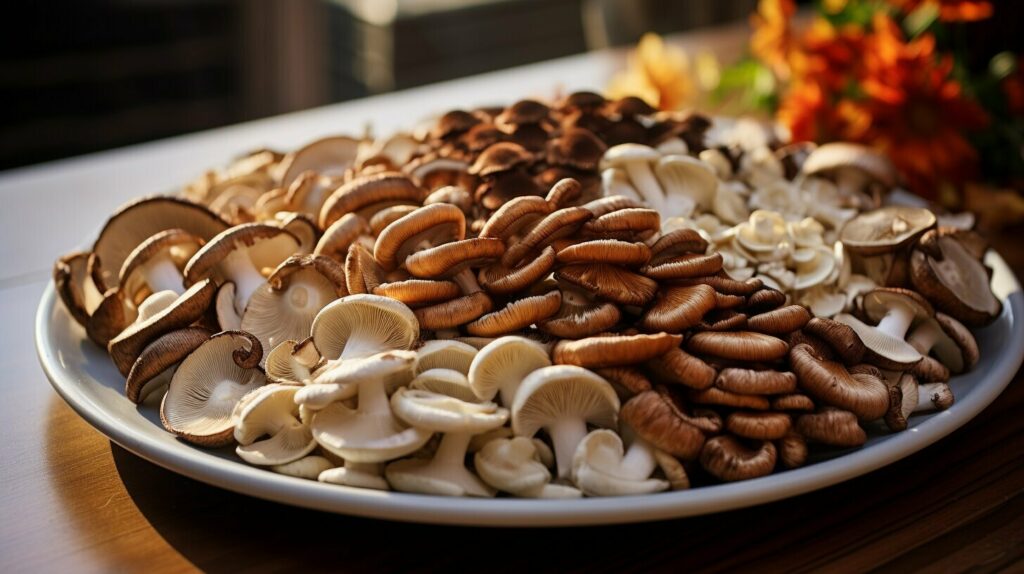
- Supports gut health by nourishing beneficial gut bacteria
- May have anti-inflammatory properties
- Promotes wound healing
While chitin is an intriguing component of mushrooms, it is just one of the many nutrients and bioactive compounds found in these fungi. In the next sections, we will explore other important aspects of mushroom nutrition, such as protein content, vitamins, minerals, and antioxidants.
Vitamin D and Light Exposure in Mushrooms
Did you know that mushrooms can produce vitamin D when they are exposed to sunlight or ultraviolet light? This fascinating process occurs because mushrooms, much like humans, have the ability to convert sunlight into vitamin D. This makes them an excellent natural source of this essential nutrient, especially for those who may have limited sun exposure.
When mushrooms are exposed to UV light, they convert a compound called ergosterol into vitamin D2. This form of vitamin D is then readily available for our bodies to utilize. In fact, studies have shown that mushrooms exposed to just a few minutes of UV light can produce a considerable amount of vitamin D2.
Not only is this an interesting natural phenomenon, but it also has significant health implications. Vitamin D plays a crucial role in various bodily functions, such as supporting bone health, boosting the immune system, and regulating mood. Including vitamin D-rich foods like mushrooms in your diet can help ensure you meet your daily requirements for this important nutrient.

| Mushroom Variety | Vitamin D2 Content (per 100g) |
|---|---|
| Portobello | ~9.6 micrograms |
| Shiitake | ~2.1 micrograms |
| White Button | ~0.1 micrograms |
| Maitake | ~1.1 micrograms |
As shown in the table above, different mushroom varieties have varying levels of vitamin D2. Portobello mushrooms, for example, are particularly rich in vitamin D2, with approximately 9.6 micrograms per 100 grams. Shiitake mushrooms and maitake mushrooms also contain significant amounts of vitamin D2, while white button mushrooms have lower levels.
Whether you consume mushrooms raw or cooked, their vitamin D content remains relatively stable. However, it’s important to note that wild mushrooms tend to have higher levels of vitamin D compared to cultivated varieties. So, if you have the opportunity, consider incorporating a variety of mushrooms into your diet to reap the benefits of their vitamin D content.
In summary, mushrooms have the remarkable ability to produce vitamin D when exposed to sunlight or ultraviolet light. This makes them a valuable natural source of this essential nutrient. Including mushrooms in your diet can help enhance your vitamin D intake and support overall health and well-being.
Mushroom Powder Supplements: A Convenient Option
If you’re looking for an easy way to incorporate mushrooms into your diet, mushroom powder supplements might be worth considering. These supplements offer a convenient and versatile way to enjoy the benefits of mushrooms without the hassle of preparation. Made from dried and ground mushrooms, mushroom powder supplements retain the nutritional value of fresh mushrooms while providing a concentrated dose of their beneficial compounds.
Mushroom powder supplements can be easily added to a variety of dishes, including smoothies, soups, sauces, and baked goods. They can enhance the flavor and nutritional content of your meals, making them a popular choice among health-conscious individuals. Whether you’re a busy professional, a fitness enthusiast, or someone who simply wants to boost their overall well-being, mushroom powder supplements provide a convenient option to add mushrooms to your daily routine.
One notable advantage of mushroom powder supplements is their long shelf life. Unlike fresh mushrooms that can spoil quickly, mushroom powder can be stored for an extended period without losing its nutritional value. This makes it a cost-effective solution for those who want to enjoy the benefits of mushrooms year-round. Additionally, mushroom powder supplements offer a concentrated source of key nutrients, such as protein, fiber, and vitamins, making them a valuable addition to a well-balanced diet.
With their versatility, convenience, and nutrient-packed profile, mushroom powder supplements can be a valuable tool in your quest for a healthier lifestyle. However, it’s important to choose high-quality supplements from reputable brands to ensure you’re getting the most out of your purchase. As with any dietary supplement, it’s also recommended to consult with a healthcare professional before adding mushroom powder supplements to your routine, especially if you have any underlying health conditions or are taking medications.
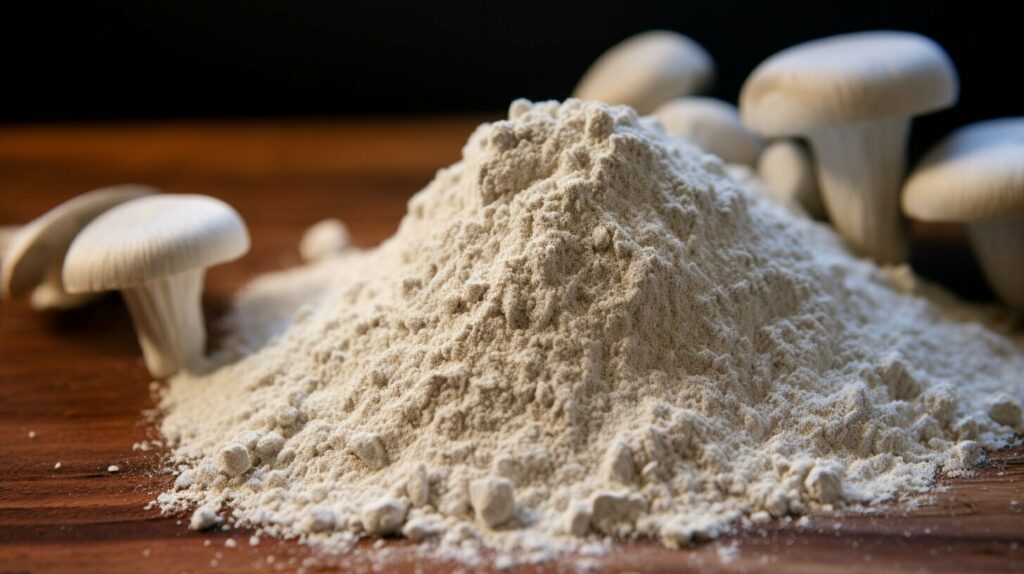
As you can see, mushroom powder supplements provide an easy and efficient way to incorporate mushrooms into your diet. Whether you’re looking to boost your protein intake, increase your fiber consumption, or simply add more nutrients to your meals, these supplements can help you achieve your goals. Remember to choose quality products and consult with a healthcare professional to ensure the best results. Enjoy the benefits of mushrooms in a convenient and delicious way with mushroom powder supplements!
Conclusion
Mushrooms are not only a delicious addition to various dishes but also offer a surprising amount of protein, making them a valuable nutritional resource. Despite their low-calorie content, mushrooms are packed with essential vitamins, minerals, and antioxidants, making them a smart choice for those seeking a well-rounded diet.
One standout nutrient in mushrooms is zinc, with varieties like cremini mushrooms being an excellent source. Zinc has been linked to numerous health benefits, including lower blood pressure and a boosted immune system. Additionally, mushrooms are rich in fiber, which is crucial for maintaining a healthy digestive system and promoting satiety.
Furthermore, mushrooms contain an indigestible carbohydrate known as chitin. This compound has been associated with various health benefits, such as aiding in weight management and supporting gut health.
One remarkable characteristic of mushrooms is their ability to increase their vitamin D content when exposed to light. This is particularly important as vitamin D plays a vital role in bone health and immune function. Incorporating mushrooms into your diet can be an effective way to boost your vitamin D intake.
If you find it challenging to incorporate mushrooms into your meals, consider mushroom powder supplements. These supplements offer the benefits of mushrooms in a convenient and versatile form, allowing you to enjoy the nutritional value of mushrooms without the need for extensive meal planning.
In conclusion, mushrooms are not only a flavorful addition to your dishes but also pack a surprising amount of protein. They are a rich source of important nutrients like zinc, fiber, and vitamin D. Whether enjoyed fresh or in powdered form, mushrooms provide a valuable contribution to a well-balanced diet.
FAQ
Q: Do mushrooms have protein?
A: Yes, mushrooms do contain protein. While they are not as high in protein as meat or legumes, mushrooms are still a good source of plant-based protein.
Q: What is the nutritional value of mushrooms?
A: Mushrooms are low in calories but rich in essential vitamins, minerals, and antioxidants. They are also a good source of fiber and protein, making them a nutritious addition to a balanced diet.
Q: How much protein do mushrooms have?
A: The exact protein content in mushrooms can vary depending on the variety. On average, mushrooms contain about 2-3 grams of protein per 100 grams.
Q: Are different mushroom varieties high in protein?
A: While all mushrooms contain some amount of protein, certain varieties, such as cremini mushrooms, can have slightly higher protein content compared to others.
Q: What is the role of protein in a healthy diet?
A: Protein is essential for various bodily functions, including muscle development and repair, hormone production, and immune system support. Including adequate protein in your diet is important for overall health and well-being.
Q: What other nutrients are found in mushrooms?
A: In addition to protein, mushrooms are a good source of vitamins (such as vitamin D, B vitamins, and vitamin C), minerals (such as potassium, copper, and selenium), and antioxidants (such as ergothioneine and glutathione).
Q: Are there any benefits of zinc in mushrooms?
A: Yes, mushrooms, particularly cremini mushrooms, are an excellent source of zinc. Zinc is important for immune system function, wound healing, and DNA synthesis.
Q: Are mushrooms high in fiber?
A: Yes, mushrooms contain a good amount of dietary fiber. Including fiber in your diet can help promote digestive health, prevent constipation, and support weight management.
Q: What is chitin in mushrooms?
A: Chitin is an indigestible carbohydrate found in the cell walls of mushrooms. While it cannot be digested by humans, it may have potential health benefits, such as acting as a prebiotic and supporting gut health.
Q: Can mushrooms increase their vitamin D content?
A: Yes, mushrooms have the ability to increase their vitamin D content when exposed to light, particularly ultraviolet (UV) light. This can be beneficial for individuals looking to increase their vitamin D intake.
Q: Are mushroom powder supplements a good option?
A: Mushroom powder supplements can provide the benefits of mushrooms in a convenient and concentrated form. However, it’s important to choose high-quality supplements and consult with a healthcare professional before adding them to your routine.







